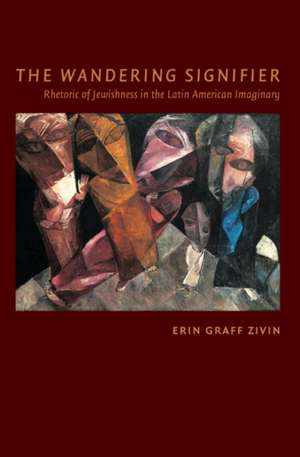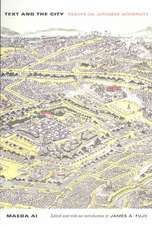The Wandering Signifier – Rhetoric of Jewishness in the Latin American Imaginary
Autor Erin Graff Zivinen Limba Engleză Paperback – 28 dec 2008
Preț: 239.16 lei
Nou
Puncte Express: 359
Preț estimativ în valută:
45.76€ • 47.90$ • 38.09£
45.76€ • 47.90$ • 38.09£
Carte tipărită la comandă
Livrare economică 31 martie-14 aprilie
Preluare comenzi: 021 569.72.76
Specificații
ISBN-13: 9780822343677
ISBN-10: 0822343673
Pagini: 240
Dimensiuni: 184 x 233 x 15 mm
Greutate: 0.36 kg
Editura: MD – Duke University Press
ISBN-10: 0822343673
Pagini: 240
Dimensiuni: 184 x 233 x 15 mm
Greutate: 0.36 kg
Editura: MD – Duke University Press
Cuprins
Acknowledgments ix
Introduction: "Jewishness," Alterity, and the Ethics of Representation 1
1. Diagnosing "Jewishness" 29
2. The Scene of the Transaction 74
3. Textual Conversations 119
4. The Limits of Representation 154
Notes 179
Bibliography 195
Index 207
Introduction: "Jewishness," Alterity, and the Ethics of Representation 1
1. Diagnosing "Jewishness" 29
2. The Scene of the Transaction 74
3. Textual Conversations 119
4. The Limits of Representation 154
Notes 179
Bibliography 195
Index 207
Recenzii
The Wandering Signifier is a superb cross-national literary study that touches on questions of diaspora, ethnic relations, and memory. It is accessible to a broad public interested in fields including Latin American studies, cultural studies, and Jewish studies. Erin Graff Zivin moves subtly between the work of Zygmunt Bauman, Jorge Luis Borges, Margo Glantz, and Ricardo Piglia (among many others) to examine the socio-political implications of the many symbolic constructions of Jewishness in Latin American literature. The imaginative scholarship, narrative excellence, and wide-ranging insights make this work required reading for students in multiple fields.Jeffrey Lesser, author of A Discontented Diaspora: Japanese Brazilians and the Meanings of Ethnic Militancy, 19601980 and coeditor of Rethinking Jewish-Latin AmericansErin Graff Zivins book proposes a sophisticated reflection on notions of national belonging, scenes of cultural crisis, and the ethical import of constructing the Jew-as-Other in critical moments of Latin American history. Indeed, this is the first study to address the powerful symbolic presence of Jews in Latin America and the first to consider the ways in which the literary representations of Jewishness enter into productive discussions of citizenship, identity, and ultimately salutary alterity. I am willing to predict that The Wandering Signifier will very soon be considered an indispensable book.Sylvia Molloy, Albert Schweitzer Professor in the Humanities, New York University This study of Jews and Jewishness in literary works from the late 19th to the late 20th centuries analyses their representation within the context of larger attitudes towards otherness. Latin American literary scholars have tended to ignore or miss the presence of Jews in writing from the region, allowing Graff Zivin to highlight the meanings attributed to Jewishness across the works of such canonical writers as Machado de Assis, José de Alencar, Marío de Andrade, Jorge Luis Borges, Roberto Arlt, Gabriel García Márquez and Mario Vargas Llosa. Issues of difference have become central to debates about Latin American culture, making this book a valuable contribution to a corpus of literature about identity in the Americas. The author draws upon concepts of otherness developed by the philosopher Emmanuel Levinas that are achieving increasing prominence in Latin American philosophy, not least through the work of Enrique Dussel. - Gavin OToole, The Latin American Review of Books, April 2009
"The Wandering Signifier is a superb cross-national literary study that touches on questions of diaspora, ethnic relations, and memory. It is accessible to a broad public interested in fields including Latin American studies, cultural studies, and Jewish studies. Erin Graff Zivin moves subtly between the work of Zygmunt Bauman, Jorge Luis Borges, Margo Glantz, and Ricardo Piglia (among many others) to examine the socio-political implications of the many symbolic constructions of Jewishness in Latin American literature. The imaginative scholarship, narrative excellence, and wide-ranging insights make this work required reading for students in multiple fields."--Jeffrey Lesser, author of A Discontented Diaspora: Japanese Brazilians and the Meanings of Ethnic Militancy, 1960-1980 and coeditor of Rethinking Jewish-Latin Americans "Erin Graff Zivin's book proposes a sophisticated reflection on notions of national belonging, scenes of cultural crisis, and the ethical import of constructing the 'Jew-as-Other' in critical moments of Latin American history. Indeed, this is the first study to address the powerful symbolic presence of Jews in Latin America and the first to consider the ways in which the literary representations of Jewishness enter into productive discussions of citizenship, identity, and ultimately salutary alterity. I am willing to predict that The Wandering Signifier will very soon be considered an indispensable book."--Sylvia Molloy, Albert Schweitzer Professor in the Humanities, New York University "This study of Jews and "Jewishness" in literary works from the late 19th to the late 20th centuries analyses their representation within the context of larger attitudes towards otherness. Latin American literary scholars have tended to ignore or miss the presence of Jews in writing from the region, allowing Graff Zivin to highlight the meanings attributed to Jewishness across the works of such canonical writers as Machado de Assis, Jose de Alencar, Mario de Andrade, Jorge Luis Borges, Roberto Arlt, Gabriel Garcia Marquez and Mario Vargas Llosa. Issues of difference have become central to debates about Latin American culture, making this book a valuable contribution to a corpus of literature about identity in the Americas. The author draws upon concepts of otherness developed by the philosopher Emmanuel Levinas that are achieving increasing prominence in Latin American philosophy, not least through the work of Enrique Dussel." - Gavin O'Toole, The Latin American Review of Books, April 2009
"The Wandering Signifier is a superb cross-national literary study that touches on questions of diaspora, ethnic relations, and memory. It is accessible to a broad public interested in fields including Latin American studies, cultural studies, and Jewish studies. Erin Graff Zivin moves subtly between the work of Zygmunt Bauman, Jorge Luis Borges, Margo Glantz, and Ricardo Piglia (among many others) to examine the socio-political implications of the many symbolic constructions of Jewishness in Latin American literature. The imaginative scholarship, narrative excellence, and wide-ranging insights make this work required reading for students in multiple fields."--Jeffrey Lesser, author of A Discontented Diaspora: Japanese Brazilians and the Meanings of Ethnic Militancy, 1960-1980 and coeditor of Rethinking Jewish-Latin Americans "Erin Graff Zivin's book proposes a sophisticated reflection on notions of national belonging, scenes of cultural crisis, and the ethical import of constructing the 'Jew-as-Other' in critical moments of Latin American history. Indeed, this is the first study to address the powerful symbolic presence of Jews in Latin America and the first to consider the ways in which the literary representations of Jewishness enter into productive discussions of citizenship, identity, and ultimately salutary alterity. I am willing to predict that The Wandering Signifier will very soon be considered an indispensable book."--Sylvia Molloy, Albert Schweitzer Professor in the Humanities, New York University "This study of Jews and "Jewishness" in literary works from the late 19th to the late 20th centuries analyses their representation within the context of larger attitudes towards otherness. Latin American literary scholars have tended to ignore or miss the presence of Jews in writing from the region, allowing Graff Zivin to highlight the meanings attributed to Jewishness across the works of such canonical writers as Machado de Assis, Jose de Alencar, Mario de Andrade, Jorge Luis Borges, Roberto Arlt, Gabriel Garcia Marquez and Mario Vargas Llosa. Issues of difference have become central to debates about Latin American culture, making this book a valuable contribution to a corpus of literature about identity in the Americas. The author draws upon concepts of otherness developed by the philosopher Emmanuel Levinas that are achieving increasing prominence in Latin American philosophy, not least through the work of Enrique Dussel." - Gavin O'Toole, The Latin American Review of Books, April 2009
Notă biografică
Erin Graff Zivin
Textul de pe ultima copertă
"Erin Graff Zivin's book proposes a sophisticated reflection on notions of national belonging, scenes of cultural crisis, and the ethical import of constructing the 'Jew-as-Other' in critical moments of Latin American history. Indeed, this is the first study to address the powerful symbolic presence of Jews in Latin America and the first to consider the ways in which the literary representations of Jewishness enter into productive discussions of citizenship, identity, and ultimately salutary alterity. I am willing to predict that "The Wandering Signifier" will very soon be considered an indispensable book."--Sylvia Molloy, Albert Schweitzer Professor in the Humanities, New York University
Descriere
Explores the symbolic presence of "Jews or Jewishness" in modern Latin American literature.











